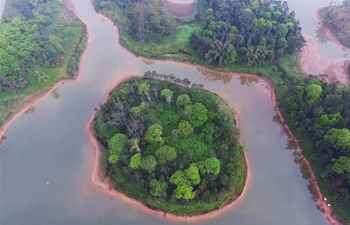LANZHOU, March 28 (Xinhua) -- Anti-desertification specialist Wang Xinping, 49, has flown to Mongolia for the second time to help locals prevent sand dunes from drifting.
Wang is a researcher at the Northwest Institute of Eco-Environment and Resources of the China Academy of Sciences in Gansu Province. His journey to Mongolia is part of a multi-national project funded by the Ministry of Science and Technology in China.
The ministry spent 10 million yuan (about 1.6 million U.S dollars) to fund a three-year program to send Chinese anti-desertification specialists to Mongolia, Israel and Kazakhstan. The specialists come from six research institutes and universities in China.
Wang and three colleagues flew to Ulan Bator on Sunday and arrived at Elsen Tasarkhai, where they are scheduled to stay until April 1. He will help Mongolian researchers fix the moving dunes in a 29-hectare experimental zone.
Wang specializes in using straw checkerboard barriers to fix the sand and grow vegetation.
"My colleagues and I have much experience looking for seeds that can endure sandy soil. I want to use my skills and solutions to help the local Mongolians. My job in Mongolia this time is to search for suitable seeds to plant in the experiment zone," he said.
Desertification is one of the most significant ecological and environmental problems in the world. It causes annual economic losses of 42 billion U.S. dollars worldwide and affects 167 countries and regions with a total population of more than two billion.
China, one of the most seriously affected countries, started research to combat desertification in the 1950s. After years of research, China is ahead of its peers.
The area of desertified land in the country is dropping by an annual average of more than 2,400 square km, compared to an annual average expansion of over 10,000 square km at the end of the last century, making China the first country in the world to achieve desert shrinkage.
About 76.8 percent of the land in Mongolia and 70 percent of the land in Kazakhstan suffer from soil degradation.
"The Chinese research institutes are well developed. They have experienced scientists and appropriate equipment," said Yerlan Turuspekov, a researcher with the Institute of Plant Biology and Biotechnology of Kazakhstan.
China has 90 projects for global cooperation in desertification prevention, and the country shares its anti-desertification technology with others.
"I hope the international cooperation will bring about more technological innovation and help people improve their living environment," said Wang.

















